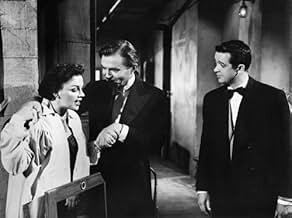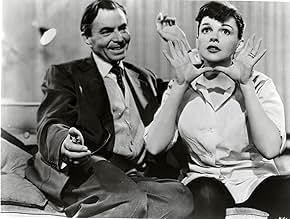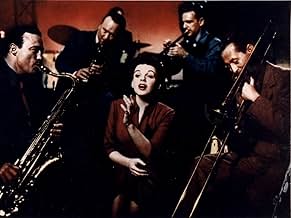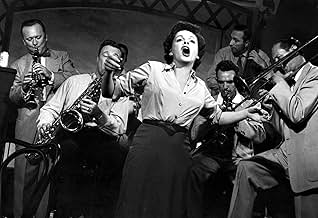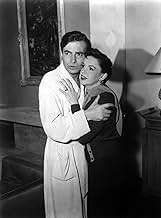NOTE IMDb
7,5/10
20 k
MA NOTE
Une vedette de cinéma aide une jeune chanteuse et actrice à trouver la gloire, alors même que l'âge et l'alcoolisme mettent sa propre carrière dans une spirale infernale.Une vedette de cinéma aide une jeune chanteuse et actrice à trouver la gloire, alors même que l'âge et l'alcoolisme mettent sa propre carrière dans une spirale infernale.Une vedette de cinéma aide une jeune chanteuse et actrice à trouver la gloire, alors même que l'âge et l'alcoolisme mettent sa propre carrière dans une spirale infernale.
- Réalisation
- Scénario
- Casting principal
- Nommé pour 6 Oscars
- 7 victoires et 14 nominations au total
Tommy Noonan
- Danny McGuire
- (as Tom Noonan)
John Alban
- Academy Awards Attendee
- (non crédité)
Laurindo Almeida
- Guitarist
- (non crédité)
Leon Alton
- Usher
- (non crédité)
Rudolph Anders
- Mr. Ettinger
- (non crédité)
David Armstrong
- Soundman
- (non crédité)
Phil Arnold
- Agent #3
- (non crédité)
Nadine Ashdown
- Esther - Age 6
- (non crédité)
Gertrude Astor
- Racetrack Spectator
- (non crédité)
Avis à la une
Is it possible to watch this fictional story without digressing to thoughts about the real life story of Judy Garland? For me it isn't. Both are permanently intertwined. And it's not just the parallel between fiction and fact, but also the dark, brooding, melancholy mood they engender, like ghosts calling out to us from a Hollywood that no longer exists.
The film's storyline is well known. I won't belabor it here, except to say that it communicates an honest and introspective indictment of the entertainment industry as it once was. The story can be thought of as a kind of archetypal Hollywood memoir, expressed as a musical.
But musicals are supposed to be upbeat, lighthearted, fun. This one isn't. Moments of humor and joy are swept away in a cascade of emotional pain and tragedy. Fiction mimics real life. How appropriate that the film's signature song "The Man That Got Away" is one that is so uncompromisingly serious, poignant, and smoldering ... a perfect vehicle for Judy Garland.
Some say she had the greatest singing voice of any entertainer in the twentieth century. This film lends credence to that assertion. Every song she sings is performed with such consummate verve, such emotional commitment that she seems to be singing not just for her contemporaries, but also for generations to come. Indeed, she is. My personal favorite is the "Born In A Trunk" segment, all fifteen minutes of it. Surrounded by sets of true cinematic art, she belts out one tune after another, including, of course, the poignant "Melancholy Baby".
Judy's singing and the music itself are what make the movie so memorable. But she also demonstrates her considerable acting talent. And the acting of other cast members is fine, especially the performances of James Mason and Jack Carson. I do think that the film was, and still is, too long, the result of an overly ambitious screenplay.
That Judy Garland was denied the Best Actress Oscar is poignant. But her talent was so massive, her uniqueness was so special, maybe fate required a compensatory level of pain and tragedy, as a prerequisite of legend.
The film's storyline is well known. I won't belabor it here, except to say that it communicates an honest and introspective indictment of the entertainment industry as it once was. The story can be thought of as a kind of archetypal Hollywood memoir, expressed as a musical.
But musicals are supposed to be upbeat, lighthearted, fun. This one isn't. Moments of humor and joy are swept away in a cascade of emotional pain and tragedy. Fiction mimics real life. How appropriate that the film's signature song "The Man That Got Away" is one that is so uncompromisingly serious, poignant, and smoldering ... a perfect vehicle for Judy Garland.
Some say she had the greatest singing voice of any entertainer in the twentieth century. This film lends credence to that assertion. Every song she sings is performed with such consummate verve, such emotional commitment that she seems to be singing not just for her contemporaries, but also for generations to come. Indeed, she is. My personal favorite is the "Born In A Trunk" segment, all fifteen minutes of it. Surrounded by sets of true cinematic art, she belts out one tune after another, including, of course, the poignant "Melancholy Baby".
Judy's singing and the music itself are what make the movie so memorable. But she also demonstrates her considerable acting talent. And the acting of other cast members is fine, especially the performances of James Mason and Jack Carson. I do think that the film was, and still is, too long, the result of an overly ambitious screenplay.
That Judy Garland was denied the Best Actress Oscar is poignant. But her talent was so massive, her uniqueness was so special, maybe fate required a compensatory level of pain and tragedy, as a prerequisite of legend.
This movie is not without its flaws, but overall, it is a masterpiece.
The quintessential story of a couple, one who's career is on the rise, the other on the decline- is made extraordinary by the performances.
Ester Blodgett, aka: Vicki Lester (Judy Garland) plays the unknown talent with pipes that would put an organ to shame. Her singing in this movie is definitely a HUGE reason to watch it- especially the show stopper, "The Man that got away." Ester meets, by chance & some help from the bottle, the cinematic icon, Norman Maine (James Mason.) Even though he's drunk, he is taken with her. Much later that night, he finds her at a club just "kickin' it" with the boys in the band. In what is probably the best 5 mins of music in the history of musicals- Judy lets it all out in "The Man that got away." Sincerely, I MYSELF, have never heard singing like that. So absolutely raw, almost uncontrolled and full-out and all heart that it always gives me goosebumps! And an unobserved Norman Maine comes out of the shadows to tell Ester that he TOO has never heard singing like that. He tells her, (completely sober after sleeping off a little) that she has a great talent. And he makes her believe it.
She eventually gets her chance with some help from Norman, and makes a big hit movie. She starts to make a lotta hit movies. Meanwhile, Norman gets cut from the studio by his longtime friend & boss, Oliver Niles. One thing leads to another & even though he is happily married now to Ester, his drinking starts up again. In a scene that is almost too awful to watch, he stumbles in on her acceptance speech at the Academy Awards. I dunno if that slap was real, but it looked real. And the ashamed look on his face afterwards looks real.
I won't give away the ending, but I will tell you why I liked this movie. First of all is Judy's singing. There are many memorable songs and moments. She always gives it her all when she sings. Or to paraphrase Ester in the movie, it's when she is her most alive. Her acting is terrific too. In a scene that is so well written and ahead of its time (and timeless), Ester tells her friend & studio head that she is worried about what's happening to her & Norman. That she hates him for the lies, for the promises to quit, and for failing. That she too feels like a failure. This scene encapsulates the ripple effect caused by alcoholism. Judy is absolutely mesmerizing as the wife who has discovered that love is not enough.
James Mason delivers one of the best & most convincing performances of an alcoholic on the decline that I've ever seen on screen. First of all, his charm & sincerity are apparent. When Libby (his Publicity Agent) says that his appeal & charm escape him, it's because he didn't see this side of him. He only saw the mean drunk and that wasn't who Norman Maine really was. James Mason is LOOKS so convincing that you'd swear he had a quick 6 or 7 drinks before the shoot. And his pain is real. In the scene where she gets him out of night court, his self-disgust and shame are vividly on his face. And the scene where he over-hears Ester & Oliver talking about him is enough to make anyone reach for the hankies. He has so much chemistry with Judy that you'd swear they were really in love. Many a reviewer has mentioned this- and I won't speculate on it- suffice to say that it adds tremendously to the movie, because it seems palpable how much Ester & Norman care about each other & are desperately in love. Definite Oscar-calibre performance by Garland & Mason here. This is the story of the Oscar that got away. In any world that was just, they both would've gotten one.
All the supporting roles are well done and not too obtrusive. My only complaint with the movie is the editing. I'm happy to have the restored version, but the editing could've made a more intense, compact version of the film. I will give one of many examples: The scene towards the end where her friend from the band arrives at her house to take her to the benefit. It is a very important scene. The next scene is at the benefit location. We have several minutes of them showing the backstage bustle before Ester & her friend enter. They already showed in the beginning of the film all the backstage confusion- it slows down the story. They could've cut directly to the part where she & him walk in. You still get a sense of what's going on around them without that long lead-in. That is just an example, there are more. But it is a minor complaint - I have a DVD & can scan when I need to. Overall this is a timeless movie with outstanding performances. A must see!!
The quintessential story of a couple, one who's career is on the rise, the other on the decline- is made extraordinary by the performances.
Ester Blodgett, aka: Vicki Lester (Judy Garland) plays the unknown talent with pipes that would put an organ to shame. Her singing in this movie is definitely a HUGE reason to watch it- especially the show stopper, "The Man that got away." Ester meets, by chance & some help from the bottle, the cinematic icon, Norman Maine (James Mason.) Even though he's drunk, he is taken with her. Much later that night, he finds her at a club just "kickin' it" with the boys in the band. In what is probably the best 5 mins of music in the history of musicals- Judy lets it all out in "The Man that got away." Sincerely, I MYSELF, have never heard singing like that. So absolutely raw, almost uncontrolled and full-out and all heart that it always gives me goosebumps! And an unobserved Norman Maine comes out of the shadows to tell Ester that he TOO has never heard singing like that. He tells her, (completely sober after sleeping off a little) that she has a great talent. And he makes her believe it.
She eventually gets her chance with some help from Norman, and makes a big hit movie. She starts to make a lotta hit movies. Meanwhile, Norman gets cut from the studio by his longtime friend & boss, Oliver Niles. One thing leads to another & even though he is happily married now to Ester, his drinking starts up again. In a scene that is almost too awful to watch, he stumbles in on her acceptance speech at the Academy Awards. I dunno if that slap was real, but it looked real. And the ashamed look on his face afterwards looks real.
I won't give away the ending, but I will tell you why I liked this movie. First of all is Judy's singing. There are many memorable songs and moments. She always gives it her all when she sings. Or to paraphrase Ester in the movie, it's when she is her most alive. Her acting is terrific too. In a scene that is so well written and ahead of its time (and timeless), Ester tells her friend & studio head that she is worried about what's happening to her & Norman. That she hates him for the lies, for the promises to quit, and for failing. That she too feels like a failure. This scene encapsulates the ripple effect caused by alcoholism. Judy is absolutely mesmerizing as the wife who has discovered that love is not enough.
James Mason delivers one of the best & most convincing performances of an alcoholic on the decline that I've ever seen on screen. First of all, his charm & sincerity are apparent. When Libby (his Publicity Agent) says that his appeal & charm escape him, it's because he didn't see this side of him. He only saw the mean drunk and that wasn't who Norman Maine really was. James Mason is LOOKS so convincing that you'd swear he had a quick 6 or 7 drinks before the shoot. And his pain is real. In the scene where she gets him out of night court, his self-disgust and shame are vividly on his face. And the scene where he over-hears Ester & Oliver talking about him is enough to make anyone reach for the hankies. He has so much chemistry with Judy that you'd swear they were really in love. Many a reviewer has mentioned this- and I won't speculate on it- suffice to say that it adds tremendously to the movie, because it seems palpable how much Ester & Norman care about each other & are desperately in love. Definite Oscar-calibre performance by Garland & Mason here. This is the story of the Oscar that got away. In any world that was just, they both would've gotten one.
All the supporting roles are well done and not too obtrusive. My only complaint with the movie is the editing. I'm happy to have the restored version, but the editing could've made a more intense, compact version of the film. I will give one of many examples: The scene towards the end where her friend from the band arrives at her house to take her to the benefit. It is a very important scene. The next scene is at the benefit location. We have several minutes of them showing the backstage bustle before Ester & her friend enter. They already showed in the beginning of the film all the backstage confusion- it slows down the story. They could've cut directly to the part where she & him walk in. You still get a sense of what's going on around them without that long lead-in. That is just an example, there are more. But it is a minor complaint - I have a DVD & can scan when I need to. Overall this is a timeless movie with outstanding performances. A must see!!
In a career of classic performances this may be Judy Garland's best role and one that certainly uses her many talents to the hilt. James Mason gives an Oscar caliber performance as well and I believe in almost any other year that he wasn't up against Brando's "On the Waterfront" performance he would and should have won.
This George Cukor film features gorgeous color and beautiful cinematography, but does suffer from choppy editing that may be the result of restored footage. The project to restore over an hour of missing footage scrapped by the producers after the original length was in excess of four and a half hours may have been done with the best intentions, but is still incomplete and leaves the film disjointed and obviously lacking. I certainly wish the original footage was never scrapped, but this spotty attempt at restoration makes you feel like your watching more of a project than a classic film. Sometimes less is more and definitely in this case.
Whatever you do make sure you see the widescreen version of this film that was originally shot in Cinemascope or you will only see about a third of the actual picture and I assure you, you won't want to miss any of it.
This George Cukor film features gorgeous color and beautiful cinematography, but does suffer from choppy editing that may be the result of restored footage. The project to restore over an hour of missing footage scrapped by the producers after the original length was in excess of four and a half hours may have been done with the best intentions, but is still incomplete and leaves the film disjointed and obviously lacking. I certainly wish the original footage was never scrapped, but this spotty attempt at restoration makes you feel like your watching more of a project than a classic film. Sometimes less is more and definitely in this case.
Whatever you do make sure you see the widescreen version of this film that was originally shot in Cinemascope or you will only see about a third of the actual picture and I assure you, you won't want to miss any of it.
Count me among those who love this film, but am I the only one who feels for Libby, played by Jack Carson? Yes, he's snide and spiteful, but for God's sake, who wouldn't be in his shoes? When he says, "Norman Maine's charm escapes me." I tend to agree with him. What makes this violent drunk so special anyway, except that he's played by James Mason? And, although she's played by Judy Garland at her radiant best, isn't Esther a classic co-dependent wife? Have any of you adoring fans ever actually dealt with a close one who's alcoholic?
When the studio mogul says, after Norman Maine dies, "you didn't know him at all," I feel like arguing the point. Libby should say, "Maybe YOU didn't know him, Oliver. Did he ever insult you for making him do his job? Did he ever punch you out? Did you ever have to continually face his dirty side, as I did, which he--and you too, Oliver--refused to confront?"
Maybe I'm a poop. But I had to say it.
And, yes, it's a brilliant film.
When the studio mogul says, after Norman Maine dies, "you didn't know him at all," I feel like arguing the point. Libby should say, "Maybe YOU didn't know him, Oliver. Did he ever insult you for making him do his job? Did he ever punch you out? Did you ever have to continually face his dirty side, as I did, which he--and you too, Oliver--refused to confront?"
Maybe I'm a poop. But I had to say it.
And, yes, it's a brilliant film.
The 1954 musicalized version of A Star Is Born is a great film. Judy Garland and James Mason (both Oscar nominated) turn in terrific performance as Esther and Norman. Like its 1937 predecessor (which starred Janet Gaynor and Fredric Marchboth Oscar nominated), the 1954 version follows the ups and down of two people set against the vicious world of Hollywood. The newer version sticks to the basic story but adds some great numbers for Garland, including "The Man That Got Away" and "I Was Born in a Trunk." In a major comeback, Garland had not worked in films since Summer Stock (1950), and her performance here is the best of her career. That she lost the Oscar to Grace Kelly for The Country Girl is one of Hollywood's great inequities. Mason lost to Marlon Brando for On the Waterfront. Garland sings superbly and is a great comic and dramatic actress. Her Esther is more vulnerable than Gaynor's just as Mason's Norman is more pathetic than March's. I love both versions. Charles Bickford and Jack Carson play the other major parts, played by Adolphe Menjou and Lionel Stander in 1937. Two major supporting roles from the 1937 version were cut from the 1954 version: Esther's first Hollywood friend (Andy Devine) and her intrepid grandmother (the great May Robson). But Garland's musical numbers make up for their absence. Oddly, despite the great hullabaloo surrounding A Star Is Born, it was not nominated for best picture, and George Cukor was bypassed in the directing category. One of the best musicals ever made.
Le saviez-vous
- AnecdotesGeorge Cukor offered Marlon Brando the role of Norman Maine on the set of Jules César (1953). "Why would you come to me?" asked Brando. "I'm in the prime of my life... If you're looking around for some actor to play an alcoholic has-been, he's sitting right over there"- pointing at his costar James Mason, who got the part.
- GaffesAfter Vicki comes home and she performs in her house for Norman, the doorbell rings and he goes to the door to accept a package for Vicki. His hair is all mussed-up when he goes to the door, but after he closes it and the camera goes back to him, there isn't a hair out of place. Then he walks over to where Vicki is and his hair is all mussed-up again.
- Citations
[last lines]
Vicki Lester: Hello, everybody. This is Mrs. Norman Maine.
- Versions alternativesContrary to popular belief, the film was not originally at 181 minutes, but rather 196 (3hrs. and 16mins.) at a post-premiere shown on August 8, 1954 in Huntington Park, California. After its second post-premiere - the very next day - two scenes of 15 minutes total were deleted; making the film run its original world debut length at 181 minutes. One was a number called "When My Sugar Walks Down the Street" that came after Judy's take of "I'll Get By" in the 'Born in the Trunk' sequence, the other was a scene where Garland and James Mason's characters (Vicki and Norman) were picnicking on the beach; production stills and promotional advertisements are the only thing left in existence of the footage. After its world premiere on September 29, 1954, 27 minutes was cut, bringing it down to a mediocre 154 time length. Those scenes were:
- 1) Esther quitting the band
- 2) The Trinidad Coconut Oil Shampoo
- 3) Esther working at a drive-in
- 4) Norman being driven away drunk in his car
- 5) Norman inquiring Esther's old landlady
- 6) Spotting Esther on the TV commercial
- 7) Tracking down Esther at her new boarding residence
- 8) Driving down the strip - Esther getting sick
- 9) "Here's What I'm Here For" musical number - Norman proposes
- 10) "Lose That Long Face" musical number - Vicki breaks down
- ConnexionsFeatured in Film Night: Special: Forty Years in Hollywood (1970)
- Bandes originalesGotta Have Me Go with You
(uncredited)
Music by Harold Arlen
Lyrics by Ira Gershwin
Performed by Judy Garland with Jack Harmon & Don McKay
Meilleurs choix
Connectez-vous pour évaluer et suivre la liste de favoris afin de recevoir des recommandations personnalisées
Détails
- Date de sortie
- Pays d’origine
- Langue
- Aussi connu sous le nom de
- Nace una estrella
- Lieux de tournage
- Church of the Good Shepherd - 505 North Bedford Drive, Beverly Hills, Californie, États-Unis(Norman Maine's funeral)
- Société de production
- Voir plus de crédits d'entreprise sur IMDbPro
Box-office
- Budget
- 5 019 770 $US (estimé)
- Montant brut aux États-Unis et au Canada
- 4 335 968 $US
- Montant brut mondial
- 4 350 001 $US
- Durée2 heures 34 minutes
- Rapport de forme
- 2.55 : 1
Contribuer à cette page
Suggérer une modification ou ajouter du contenu manquant









